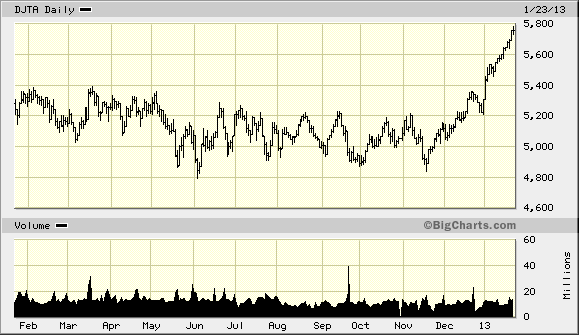Dow Theory is one of the oldest forms of technical market analysis. The theory was originally devised by Charles Dow, founder of the Wall Street Journal, over 100 years ago. While there are six major tenets of the Dow Theory, the most famous one states that both the Dow Jones Industrials and the Dow Jones Transportation Average must confirm each other in order for a bull market to be legitimate.
Many analysts utilize Dow Theory in an attempt to forecast the economy. Although one of Dow Theory’s six major tenets states that the averages discount the business outlook, the theory isn’t always the crystal ball that many of its adherents believe it to be. For instance, an extended rally in the Dow Transports doesn’t always forecast a rosy economy. There are times when movements in the Transports can be quite deceptive.
One of those times occurred in 2007 just prior to the credit crisis. The Transports made a new all-time high in July 2007, prompting many analysts to proclaim that the economic outlook was stronger than it appeared at the time. That prediction failed, of course, as the U.S. economy went into recession just five months later.
The Dow Transports have made yet another new all-time high as of Tuesday, Jan. 22, producing once again a litany of bullish economic forecasts. One respected analyst for a well known brokerage firm went so far as to say, “Ladies and gentlemen, for the economically sensitive Trannies to do this speaks loudly to my premise that there will be no recession in 2013.”

Based on my experience, this is a premature statement at best. A lot can happen between now and year-end, especially in view of what happened in the parallel year of 2007. The long-term yearly Kress cycle outlook tells us to maintain a cautious approach as we head further into 2013 and especially as we approach 2014.
One instance of when the Dow Theory can be used as an economic barometer occurs when the economy is weak and government statistics show contraction month after month. If the Dow Industrials and Transports begin moving higher in synch over a period of several weeks-to-months in the face of economic weakness, it will almost certainly portend a stronger economy down the road. Conversely, when the economy is strong and the Industrials and Transports are weakening, the implication is that the economy will follow suit.
A more likely explanation for the new high in the Dow Transports is that it has resulted from Wall Street fund managers being behind the proverbial “eight ball” entering the New Year. Hot money inflows can lift equity prices irrespective of economic factors for weeks and sometimes even months at a time.
The lesson of 2007 is not to let Wall Street’s hype of the new all-time high in the Transports lead to excessive greed and blithe optimism about the economic outlook. As 2007 taught us, even the rosiest economic outlook can quickly fall apart with the right catalyst.
Many analysts utilize Dow Theory in an attempt to forecast the economy. Although one of Dow Theory’s six major tenets states that the averages discount the business outlook, the theory isn’t always the crystal ball that many of its adherents believe it to be. For instance, an extended rally in the Dow Transports doesn’t always forecast a rosy economy. There are times when movements in the Transports can be quite deceptive.
One of those times occurred in 2007 just prior to the credit crisis. The Transports made a new all-time high in July 2007, prompting many analysts to proclaim that the economic outlook was stronger than it appeared at the time. That prediction failed, of course, as the U.S. economy went into recession just five months later.
The Dow Transports have made yet another new all-time high as of Tuesday, Jan. 22, producing once again a litany of bullish economic forecasts. One respected analyst for a well known brokerage firm went so far as to say, “Ladies and gentlemen, for the economically sensitive Trannies to do this speaks loudly to my premise that there will be no recession in 2013.”

Based on my experience, this is a premature statement at best. A lot can happen between now and year-end, especially in view of what happened in the parallel year of 2007. The long-term yearly Kress cycle outlook tells us to maintain a cautious approach as we head further into 2013 and especially as we approach 2014.
One instance of when the Dow Theory can be used as an economic barometer occurs when the economy is weak and government statistics show contraction month after month. If the Dow Industrials and Transports begin moving higher in synch over a period of several weeks-to-months in the face of economic weakness, it will almost certainly portend a stronger economy down the road. Conversely, when the economy is strong and the Industrials and Transports are weakening, the implication is that the economy will follow suit.
A more likely explanation for the new high in the Dow Transports is that it has resulted from Wall Street fund managers being behind the proverbial “eight ball” entering the New Year. Hot money inflows can lift equity prices irrespective of economic factors for weeks and sometimes even months at a time.
The lesson of 2007 is not to let Wall Street’s hype of the new all-time high in the Transports lead to excessive greed and blithe optimism about the economic outlook. As 2007 taught us, even the rosiest economic outlook can quickly fall apart with the right catalyst.
